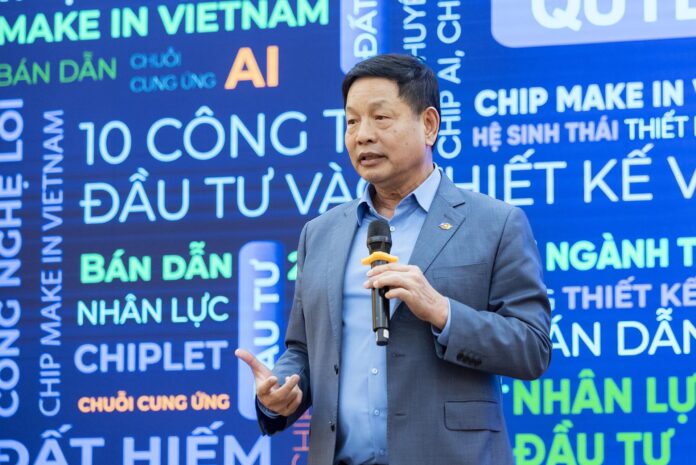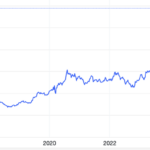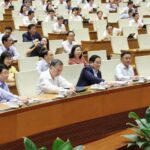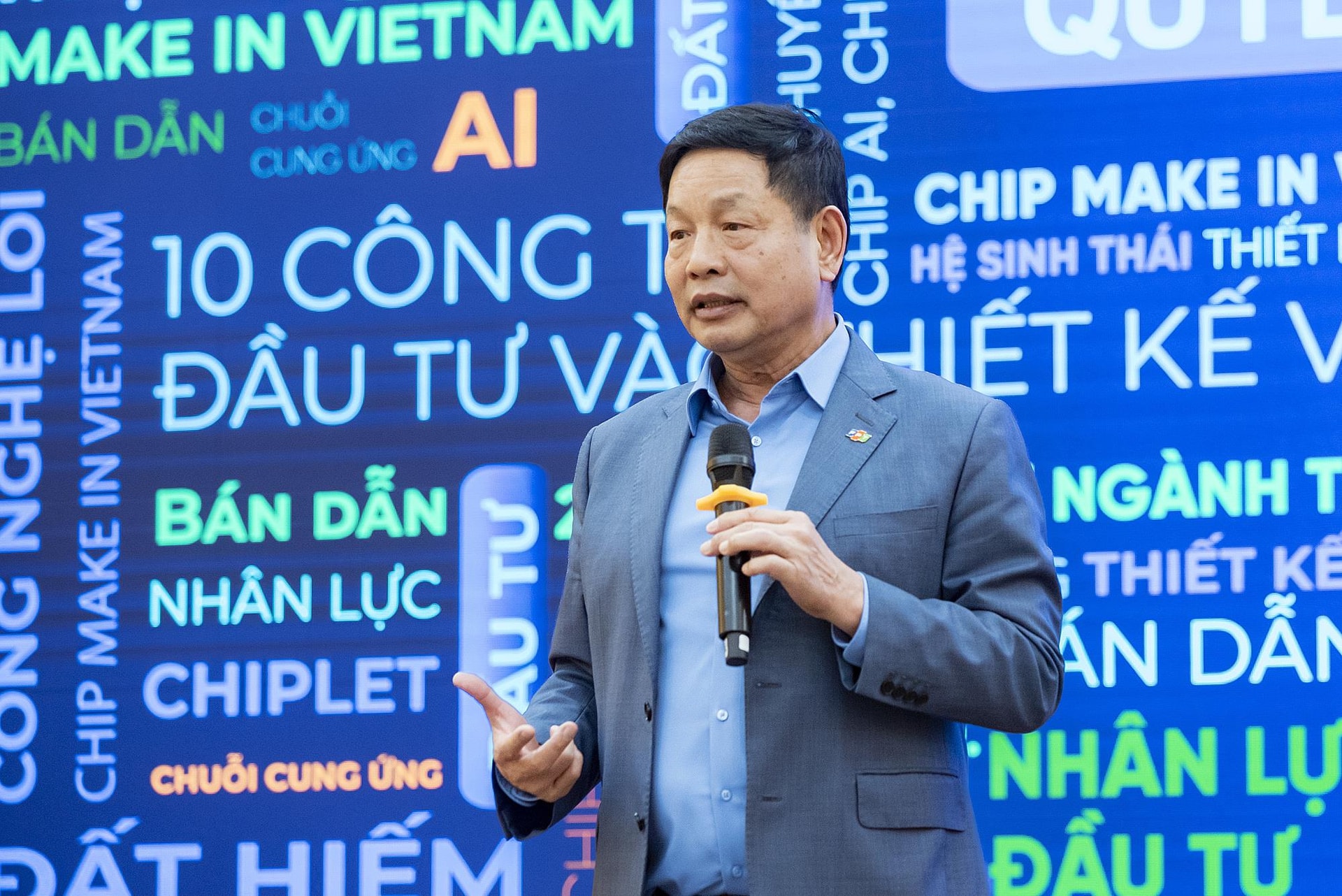
Mr. Truong Gia Binh, Founder and Chairman of VINASA, Chairman of the Semiconductor Industry Development Committee, and Chairman of FPT Corporation, delivers a speech at the event.
At the event organized by the Vietnam Semiconductor Industry Development Committee on the afternoon of June 13, Mr. Truong Gia Binh, Founder and Chairman of VINASA, Chairman of the Semiconductor Industry Development Committee, and Chairman of FPT Corporation, emphasized in his opening remarks: “The semiconductor industry is ushering in a new chapter for Vietnam, offering golden opportunities to break through and play a significant role in the global value chain, contributing to building an autonomous and resilient economy.”
Regarding Vietnam’s opportunities, Mr. Binh likened semiconductors to “the staple food of the digital age – just like rice in South Korea,” while AI is “the new strategic energy source – like oil in the future.” Decision 1131 of the Prime Minister has established AI and semiconductors as two critical technologies, and Vietnam has advantages in developing this industry, especially with its strong human resources and aspiration to advance.
Mr. Binh emphasized that pursuing the semiconductor industry requires people with an aspiration for change, as it is a rapidly evolving field with constantly updating technology. He reflected on FPT’s early globalization efforts over 25 years ago, when they ventured into the global market in the 1990s but lacked support from the wider Vietnamese business community, causing a delay in embracing the technology globalization wave.
“Back then, we visited the Hsinchu Science Park in Taiwan and stopped by MediaTek’s headquarters when they were still a small company. However, we returned with a preconceived notion that disregarded the potential of the semiconductor industry,” Mr. Binh shared.
Since then, FPT has focused its efforts on software exports and achieved significant successes. In contrast, MediaTek gradually expanded its market share in mobile semiconductors and is now the second largest phone chip manufacturer in the world, after Qualcomm. Mr. Truong Gia Binh affirmed: “FPT will not repeat those mistakes again.”
The seminar, “A New Chapter for the Semiconductor Industry: Vietnam’s Opportunities,” attracted hundreds of delegates, including leaders from ministries, sectors, and localities, technology enterprises, and academic institutions, as well as Vietnamese experts in the semiconductor field working for large corporations worldwide.
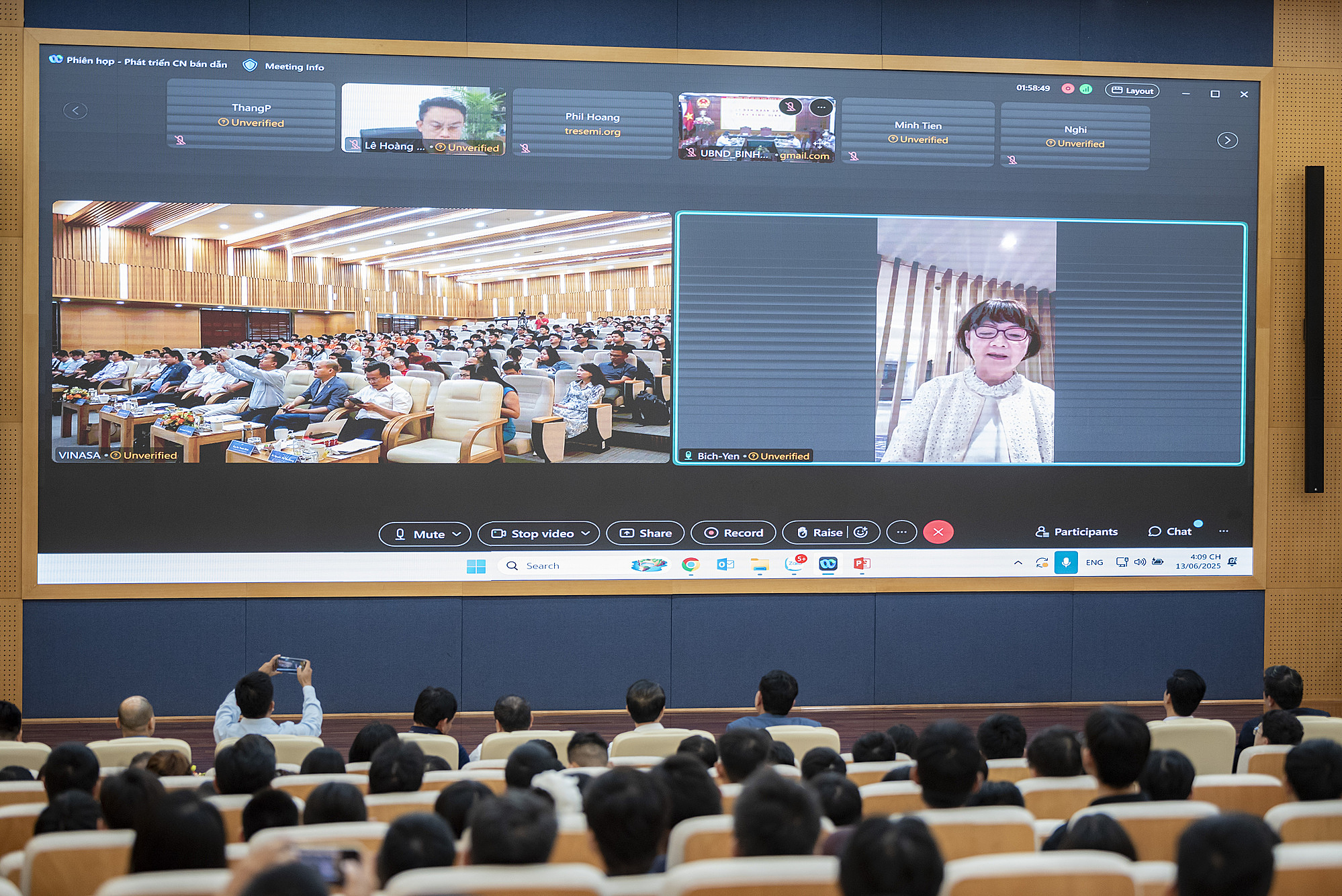
Ms. Nguyen Bich Yen, a member of the Institute of Electrical and Electronics Engineers (IEEE), and Vietnamese experts in the semiconductor field working for large corporations worldwide, participate in the event.
Mr. Phil Hoang, Senior Technical Manager at Skyworks Solutions, headquartered in Austin, Texas, and founder of Tresemi (an organization of American technology experts with a network of experienced semiconductor specialists), proposed establishing a design incubation organization in Vietnam and initiating the Vietnam Semiconductor Alliance. This alliance aims to connect academia, businesses, startups, and the government to foster a sustainable semiconductor ecosystem. Tresemi pledged to collaborate through training programs in partnership with NIC, Hanoi University of Technology, and the Da Nang Center for Semiconductors & AI.
Representing the research and training sector, Prof. Dr. Tran Xuan Tu from Vietnam National University, Hanoi, emphasized the need for young people to have the aspiration to prosper through knowledge and technology. He shared that Vietnam National University, Hanoi, has approved seven new training programs in semiconductors and established three research institutes focusing on materials, AI, and electronics technology. Additionally, the university is negotiating cooperation with TSMC and Amkor to build a chip design ecosystem and enhance advanced packaging capabilities.
Mr. Phung Viet Thang, Director of Intel Vietnam, affirmed that FDI remains crucial but is no longer the decisive factor. Vietnam needs to develop its internal strength and human resources to sustainably engage in the global value chain. He highlighted the vital role of collaboration among educational institutions, businesses, and the government to realize technological potential.
Also at the event, the leader of Binh Dinh province, which aims to become a center for the semiconductor and AI industries by 2030, shared that the province considers semiconductors a strategic technology, integral to its digital economic orientation. With a technology infrastructure foundation in Quy Nhon and an emerging AI and data science ecosystem, Binh Dinh is ready to attract investment and develop human resources in semiconductors. The province is committed to accompanying businesses in building a high-tech center locally.
Mr. Le Nam Trung, Deputy Director of the Information Technology Industry Department, Ministry of Science and Technology, emphasized that, especially since the third quarter of 2024, the government has been directing and issuing important policies and strategies, such as the National Semiconductor Industry Development Strategy, at an impressive pace, providing a clear and specific legal framework for the industry. Mr. Le Nam Trung also pointed out remaining challenges, such as policy implementation, identifying focal points, and engaging businesses, which need further improvement. He called for closer collaboration from businesses, associations, and experts to ensure that policies are effectively implemented, contributing to a robust technology ecosystem.
The speakers also engaged in candid discussions about the current state, challenges, and solutions for developing the semiconductor industry, proposing supportive policies, attracting investments, training high-quality human resources, and promoting international cooperation. The open discussion at the end of the program provided an opportunity for delegates to connect and share initiatives to realize the aspiration of making Vietnam a crucial link in the global semiconductor supply chain. The event concluded with a positive atmosphere, collaborative directions, and concrete steps toward the sustainable development of Vietnam’s semiconductor industry.
“HDBank and PV Power Sign VND2,000 Billion Credit Limit Agreement: A Step Towards Sustainable Energy Transition.”
“Forging ahead with its commitment to green finance and sustainable development, on June 11, 2025, HDBank (HOSE: HDB), a prominent commercial bank in Vietnam, inked a significant credit agreement with PV Power, a foremost electricity producer under the umbrella of Petrovietnam. The agreement comprised a credit limit of VND 2,000 billion, marking a pivotal step in HDBank’s journey toward fostering environmentally conscious initiatives.”
The Congress Passes Resolution to Amend the Constitution: County-Level Operations to Cease from July 1st, 2025
The National Assembly’s resolution to amend and supplement several articles of the 2013 Constitution stipulates the cessation of district-level administrative units across the country from July 1, 2025, onwards. Additionally, it affirms the status of the Vietnam General Confederation of Labour, the Vietnam Farmers’ Union, the Ho Chi Minh Communist Youth Union, the Vietnam Women’s Union, and the Vietnam Veterans Association as socio-political organizations under the umbrella of the Vietnam Fatherland Front.
The Electric Mini: A New Eco-Warrior Arrives in Vietnam.
Introducing the most affordable mini electric car in the Vietnamese market. With its compact size and sleek design, this eco-friendly vehicle is perfect for navigating the bustling streets of Vietnam. Its efficient performance and low maintenance costs make it an economical choice for those seeking a sustainable and cost-effective mode of transportation.

